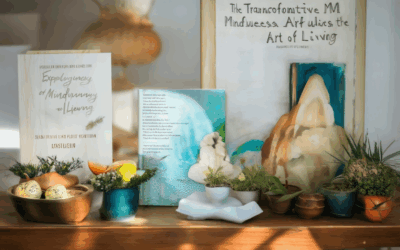Exploring the intricate dance between personal reflections and universal truths, the concept of happiness remains one of life’s most enduring mysteries. While external factors undeniably shape our experiences, it’s our unique personal insights that often reveal the true essence of joy. This article delves into the multifaceted nature of happiness, blending personal anecdotes with cutting-edge research to uncover what truly makes us thrive. From dissecting the psychological underpinnings of joy to examining how individual perspectives evolve over time, we’ll explore the interplay between subjective experiences and objective truths. By merging the wisdom of leading researchers with practical, everyday strategies, this piece aims to provide a holistic view of happiness—one that resonates deeply with your own journey. Whether you’re seeking validation for your beliefs or discovering new ways to cultivate joy, prepare to embark on a transformative exploration of personal insights on happiness.
Key Takeaways
– Happiness is built on 7 core pillars: Meaning, truth, strategy, love, body, mind, and trust, each contributing uniquely to well-being.
– Five simple rules can enhance happiness: Practice gratitude daily, show unconditional kindness, cultivate meaningful relationships, engage in activities you love, and set achievable goals.
– Eight mindful steps lead to joy: Cultivate gratitude, practice compassion, embrace non-judgmental awareness, seek uplifting relationships, live aligned with values, reflect regularly, stay present in the moment, and forgive freely.

My Personal Idea of Happiness
Happiness, to me, is a dynamic and evolving state of being. It’s not fleeting moments of joy or brief periods of contentment, though those certainly play a role. Rather, it’s an ongoing sense of fulfillment that arises from aligning my actions with my values, fostering meaningful connections, and embracing growth.
Key Components of My Happiness
- Meaningful Relationships: Surrounding myself with individuals who inspire and challenge me, creating a support network that enriches my life.
- Personal Growth: Continuously learning, exploring new interests, and striving to improve myself, which keeps my spirit alive and engaged.
- Nature and Environment: Spending time outdoors, whether hiking, gardening, or simply enjoying the beauty of the world around me, brings me immense peace and joy.
- Creativity and Expression: Engaging in creative pursuits, whether writing, painting, or cooking, allows me to express myself and connect with my inner thoughts.
- Helping Others: Knowing that I’m making a positive impact on someone’s life, whether through volunteering or offering a kind word, fills my heart with warmth.
How I Find Purpose
I believe purpose is discovered through introspection and exploration. It’s about identifying what truly matters to me and dedicating time to pursue it. Whether it’s through career aspirations, hobbies, or community involvement, finding purpose gives my life direction and meaning.
Moments That Bring Me Joy
Joy often comes in small, unexpected moments: the first sip of a morning coffee, a walk in the park, or a heartfelt conversation with a friend. These moments remind me of the simple pleasures that make life worthwhile.
Sustaining Happiness
Maintaining happiness requires intentional effort. I prioritize self-care, cultivate gratitude, surround myself with uplifting people, and embrace challenges as opportunities for growth. By staying present and focusing on what I can control, I find resilience in facing life’s ups and downs.
Ultimately, happiness for me is about living authentically and fully, knowing that each day brings new opportunities to grow and thrive. It’s a journey, not a destination, and I’m committed to navigating it thoughtfully and joyously.
What is Happiness in My Own Opinion?
Happiness is a multifaceted concept that encompasses a range of emotions and experiences. To me, happiness goes beyond mere moments of joy or excitement. It’s about finding meaning, experiencing fulfillment, and living a balanced, purposeful life. Here’s a deeper exploration:
Defining Personal Happiness
- Happiness is subjective and varies greatly from person to person.
- It often stems from positive relationships, personal growth, and achieving goals.
- Small acts of kindness, gratitude, and mindfulness can significantly enhance happiness.
- Happiness isn’t static; it evolves as circumstances and personal goals change.
The Role of Mindset
- A growth mindset plays a crucial role in fostering long-term happiness.
- Learning to adapt and embrace challenges contributes to overall well-being.
- Cognitive Behavioral Therapy emphasizes the importance of changing negative thought patterns to cultivate happiness.
Impact on Health and Relationships
- Happiness has been shown to boost immune function, reduce stress, and prolong lifespan.
- Strong social connections and supportive relationships are key predictors of happiness.
- Expressing gratitude and showing compassion towards others can deepen happiness.
Biological and Psychological Factors
- Endorphins released during activities like exercise, laughter, or sex contribute to happiness.
- Neuroscience research highlights the brain’s role in creating and reinforcing happy states.
- Psychological flexibility and resilience are important components of sustained happiness.
Happiness in Action
- Pursuing passions and aligning actions with personal values increases happiness.
- Setting achievable goals creates a sense of accomplishment and fulfillment.
- Volunteering or helping others provides a unique form of happiness.
While there are many theories and definitions of happiness, what matters most is how each individual defines and pursues their own version of it. By focusing on what brings meaning and fulfillment, we can create a life that feels truly happy and purposeful.

Five Facts About Happiness
- Happiness Can Be Contagious: Research shows that spending time with happy people can increase your own happiness levels, creating a positive ripple effect in social environments.
- Gratitude Practices Enhance Well-being: Regularly journaling things you’re grateful for has been proven to boost long-term happiness and improve overall life satisfaction.
- Happiness Varies Across Cultures: What brings joy to one culture might differ significantly from another, highlighting the diverse factors that influence happiness globally.
- Positive Emotions Have Health Benefits: Experiencing positive emotions can lower stress, improve mental health, and even contribute to a longer lifespan by reducing the risk of certain diseases.
- Happiness Is a Skill That Can Be Learned: Through practices like mindfulness, emotional intelligence, and self-awareness, individuals can develop greater resilience and emotional well-being.
For more insights on happiness and personal growth, visit Peter Spirito .

The 7 Pillars of Happiness
The concept of happiness is multifaceted, encompassing various aspects of life that contribute to overall well-being. According to the book “41 Minutes to Be Happy,” there are seven key pillars that support happiness. These pillars provide a framework for understanding what leads to joy and fulfillment.
- Meaning : Finding purpose and satisfaction in life is a cornerstone of happiness. Engaging in activities that bring fulfillment, such as pursuing passions, volunteering, or spending time with loved ones, helps individuals feel grounded and content.
- Truth : Honesty and transparency in relationships foster trust and mutual respect. Being authentic allows for deeper connections and reduces emotional clutter, which is vital for long-term happiness.
- Strategy : Setting clear goals and employing effective strategies to achieve them is essential. Whether personal or professional, having a plan and the discipline to execute it contributes significantly to a sense of accomplishment and growth.
- Love : Emotional connections play a pivotal role in happiness. Cultivating and nurturing relationships filled with care, affection, and understanding enriches life and provides a strong foundation for resilience.
- Body : Physical health is a fundamental aspect of happiness. Regular exercise, a balanced diet, and adequate sleep maintain not just the body but also the mind, ensuring overall vitality and energy levels.
- Mind : Mental well-being is equally important. Practices like mindfulness, stress management, and cultivating a positive mindset help individuals navigate challenges and maintain a healthy perspective on life.
- Trust : Trust is the bedrock of strong relationships, whether personal or professional. It builds security and reliability, allowing individuals to feel safe and supported in their interactions.
By focusing on these seven pillars, individuals can create a harmonious balance that leads to sustained happiness and a fulfilling life.
What Are the 5 Rules of Happiness?
- Practice Gratitude Daily – Reflect on what you’re thankful for each day to foster a sense of joy and appreciation.
- Show Kindness Unconditionally – Small acts of kindness can significantly brighten someone’s day and contribute to overall happiness.
- Cultivate Meaningful Relationships – Strong connections with family, friends, and community are essential for emotional well-being.
- Engage in Activities You Love – Spend time doing things that bring you joy and fulfillment, whether hobbies, passions, or creative pursuits.
- Set and Achieve Personal Goals – Having clear objectives gives life purpose and a sense of accomplishment.

What Are the 8 Mindful Steps to Happiness?
Mindfulness has become a cornerstone of modern well-being practices, offering a path to finding lasting happiness. Below are eight mindful steps that can guide you toward a more fulfilling life, rooted in awareness, compassion, and purpose.
- Cultivate Gratitude : Begin each day by acknowledging the small joys around you. This practice fosters a sense of abundance and contentment, anchoring your mindset in the present moment.
- Practice Compassion : Treat yourself and others with kindness. Extend compassion to those who challenge you, understanding that everyone faces struggles. This perspective fosters stronger relationships and inner peace.
- Embrace Non-Judgmental Awareness : Observe your thoughts and emotions without labeling them as good or bad. This non-judgmental awareness helps you see situations more clearly and respond with wisdom.
- Seek Meaningful Relationships : Surround yourself with individuals who uplift and inspire you. Meaningful connections deepen your sense of belonging and provide emotional support during tough times.
- Live in Alignment with Values : Align your daily actions with your core values. This consistency brings a sense of purpose, reducing feelings of emptiness or dissatisfaction.
- Engage in Regular Reflection : Spend time alone or journal to reflect on your journey. This practice helps you process emotions, clarify goals, and gain clarity on life’s bigger questions.
- Be Present in the Moment : When stress arises, ground yourself by focusing on your senses. Pay attention to the present moment, whether it’s the taste of your morning coffee or the feel of the sun on your skin.
- Forgive and Let Go : Hold onto grudges lightly. Forgiving others (and yourself) frees you from emotional weight, allowing space for joy and growth.
By integrating these mindful steps into your daily life, you create a ripple effect of positive change, leading to greater happiness and fulfillment. Remember, the journey to happiness is a continuous one, and every small step forward counts.




0 Comments